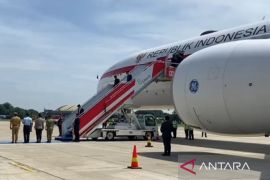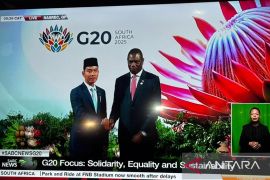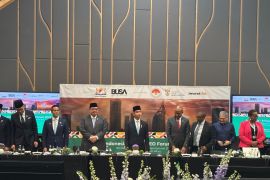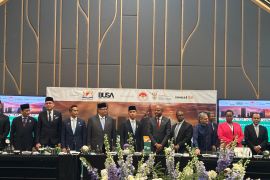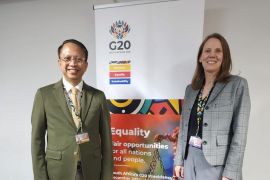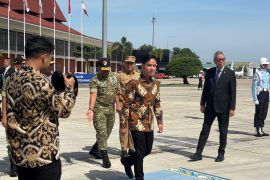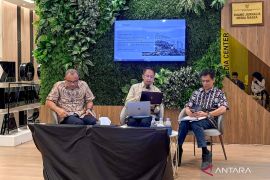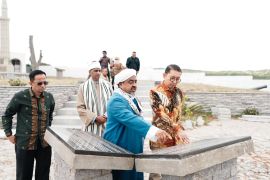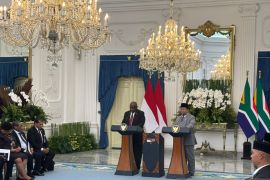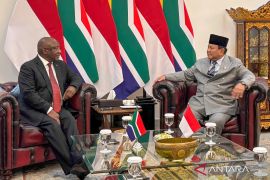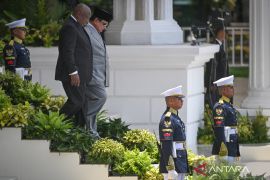The statement was made by National Council of African Women (NCAW) President Mapula Nkomo.
"I do not know how far you understand our history, but in the past we were divided by apartheid, even for women`s movement. However, now, we are united," she noted during an interview with Antara in Yogyakarta on Wednesday.
Nkomo arrived in Yogyakarta to attend ICW`s convention hosted by Indonesia on Sept 13-18. She leads a delegation of 10 women, including white ladies -- members of the National Council of Women for South Africa (NCWSA).
In the past, the apartheid was a policy of racial segregation that applied to every single aspect of life of the South African people. Thus, women`s movement also had two organizations whose membership was based on their race.
The NCAW alone was born out of the struggle in South Africa in mid-1935 to 1937 when the ruling administration issued a bill knowingly as "Hertzog Bills" that disenfranchised black citizens, specifically the Cape-colored population that had enjoyed voting rights and the aspirations of other African nations that were looking forward to the right to vote.
Hence, the native African women began to unite and initiated the birth of NCAW to fulfill their aspirations, mostly related to family and children`s welfare, elderly, and community`s issues.
Its elder sister organization, the National Council of Women for South Africa (NCWSA), had been more advanced in women`s movement, but although it was only accommodating white women, ICW recognized it as the representative of South Africa up until now.
However, over the years of South African`s movement to be independent and free of the apartheid, NCWSA kept losing its membership, while its original members and committees are aging.
"Hence, they approached us two years ago, and we began negotiations. They said like `we have the membership, but we do not want to close the shop,`" Nkomo noted.
Finally, during the national conference of NCAW and NCWSA in December 2017, they came up with a solution that the two women`s organizations should become one and accommodate all African women, regardless of their ethnicity and skin color.
However, as it is ICW`s regulation that one country can only be represented by one organization, so the transfer of representative status from NCWSA to NCAW would be only effective in 2019, a year after the 35th general assembly.
However, this time, the NCWSA and NCAW have used "NCAW" already to refer to them as a single organization that represents South African women, and during one of the plenary sessions, the South African delegates will present a report to the ICW regarding this union.
"Only after this convention, they (NCWSA) will officially step down, so next year, we will be officially recognized as the representative of South Africa in ICW," Nkomo explained.
With regard to Indonesia`s role as the host of the 35th ICW`s General Assembly, Nkomo remarked that South African delegates are looking forward to working closely and sharing experiences with the ICW and the Indonesian Women`s Congress or Kowani in the effort to transform society through empowering women, as envisioned in this year`s main theme.
"We heard a lot about women`s movement in Indonesia, and we would like to have more opportunities to learn from your experience," President of NCAW noted.
Until Wednesday evening, 20 delegations of ICW`s members, including Indonesia, that had arrived in Yogyakarta to attend the ICW`s general assembly were South Africa, Australia, Bangladesh, Belgium, Fiji, the Philippines, Finland, India, South Korea, Lebanon, Malta, Papua New Guinea, France, New Zealand, Singapore, Switzerland, Turkey, Nigeria, and Taiwan.
Apart from the various plenary sessions, the event will be featuring several expert speakers in its discussion panels.
At least four discussion panels, with themes derived from the main one, "Transforming Society through Women`s Empowerment," featured women figures, who are experts in their respective fields, including Minister of State-Owned Enterprises Rini Soemarno, Special Advisor to Japanese Prime Minister Shinzo Abe on Gender Equality and Women Empowerment Akiko Yamanaka, the ICW`s permanent representative to the United Nations Mohinder Watson, as well as Malaysian higher education figure Syarifah Hapsah.
The 35th ICW General Assembly is expected to result in a document on the efforts to empower women across the globe, which will be declared at the Village Economic Hall in a community-based tourism destination in the Borobudur, Magelang District, Central Java, supported by 20 state-owned companies.
The event is held by the ICW and the Indonesian Women`s Congress or Kowani, in cooperation with the Ministry of State-Owned Enterprises, in which 35 state-owned companies are involved in supporting the event, including Antara News Agency.
Editing by Fardah
Reporter: Azizah Fitriyanti
Editor: Bustanuddin
Copyright © ANTARA 2018

